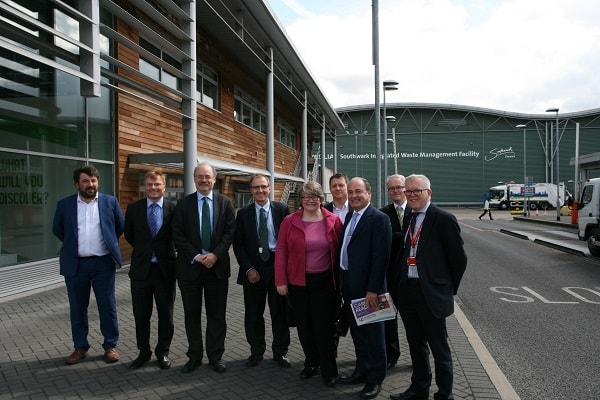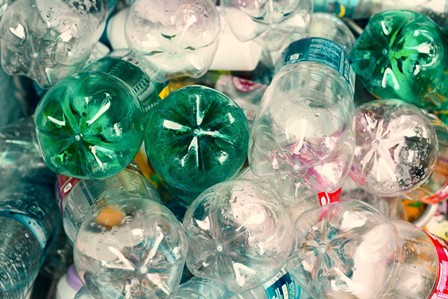Top government scientists today recommended that the exporting or disposing of waste should end.
The lack of support for exports comes in a government-funded report which describes ‘waste’ as an “enormous opportunity” in terms of resources, and promotes the idea of more recycling or reuse of materials within the UK. But while it has been published by government, the report repeatedly says that it is not government policy.
The comments come within a study, From Waste to Resource Productivity published today (14 December). Some 15 months late, it has been published without comment or fanfare by the two government departments involved – Defra and the Government Office for Science.

In 2016 the two scientists (third and fourth from left) visited sites including Veolia’s facility in Southwark with environment Minister Therese Coffey
However, some of its ideas and thinking are likely to filter through to ongoing work by Defra and to next year’s waste strategy.
Resources
Sir Mark Walport, former chief of the Government Office for Science, who headed up the report, offers some strong words on the exports of waste. He says: “A major theme of this report is that we need to stop thinking in terms of waste and focus instead on how we make the most of our resources… There are big opportunities for the UK to become a more prosperous and secure society by increasing our resource productivity. That will also mean breaking our reliance on imported products and jettisoning an approach to waste that focuses on its disposal or export.”
Study
Three documents have been published. One is a 45 page main report, From waste to resource productivity. The second is a 222 page document with a similar title which contains evidence and case studies. These have been contributed by experts from across the waste and recycling sector, including from CIWM, ISWA and LARAC.
Defra appears to have already listened to recommendation one of the report which is a call for a new waste and resources policy – this is now expected in early 2018. The department’s chief scientific adviser Professor Ian Boyd, co-authored the report with Sir Mark.
Costs
The study finds that there is opportunity with waste and that “much of it is a potential resource that can be recovered and reused in a huge number of different ways.”
There appears to be an interest by the authors in passing costs to manufacturers and product suppliers for dealing with waste down the line. The authors say that it is “essential to explore mechanisms to ensure the costs of waste are borne by those who produce it, rather than local authorities”, and it is suggested that Defra, DCLG and Treasury look this in more depth.
Targets
The scientists include a look at recycling targets. They say: “There remain deeper questions about how realistic waste recycling ambitions are, and whether progress towards them requires more radical solutions. As a measure of the scale of the task ahead, achieving a 70% recycling rate would require councils to ensure that almost every household recycled virtually all their packaging at the kerbside, captured their food waste separately, and used mechanisms such as special collections to place bulky items into recycling streams. If further decreasing waste incurs greater costs, this inevitably raises the question of how costs should be partitioned between the actors in the pathways from materials to waste.”

The scientists suggests that the case for recycling of plastics is not straightforward
Plastics
And, reference is made to plastics recycling in a section on the economics of waste collection with the implication that the case for recycling is not straightforward for plastics.
The study declares: “For some abundant materials, like plastics, it usually takes less energy to manufacture them from primary sources than to remake them from waste. For other materials, like some metals, the case for recovery from waste is more straightforward. In general, those materials that take a lot of energy to produce in the first place are more economical to recover than those that cost less energy.”
Local authorities
In a section on local government, the authors reference councils needing to maintain service levels and work within tight budgets. They say: “This challenging environment has led to councils finding ways of working in partnership, whether by sharing officer resource, full-scale realignment of complete waste services, or collective marketing of recyclable materials.”
Related links
From Waste to Resource Productivity
The post Scientists press for waste to be used as UK resource appeared first on letsrecycle.com.
Source: letsrecycle.com Plastic


